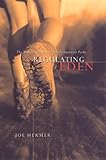Regulating Eden : The Nature of Order in North American Parks / Joe Hermer.
Material type: TextPublisher: Toronto : University of Toronto Press, [2002]Copyright date: ©2002Description: 1 online resource (176 p.)Content type:
TextPublisher: Toronto : University of Toronto Press, [2002]Copyright date: ©2002Description: 1 online resource (176 p.)Content type: - 9780802081827
- 9781442679160
- 346.7104/6783
- KE5207
- online - DeGruyter
| Item type | Current library | Call number | URL | Status | Notes | Barcode | |
|---|---|---|---|---|---|---|---|
 eBook
eBook
|
Biblioteca "Angelicum" Pont. Univ. S.Tommaso d'Aquino Nuvola online | online - DeGruyter (Browse shelf(Opens below)) | Online access | Not for loan (Accesso limitato) | Accesso per gli utenti autorizzati / Access for authorized users | (dgr)9781442679160 |
restricted access online access with authorization star
http://purl.org/coar/access_right/c_16ec
State and Provincial Parks are represented as inherently natural places set apart from the disorder of everyday life, places that are intrinsically 'wild' and must be protected. Yet, in order to experience the naturalness and freedom of the parks, we must embrace the very forms of regulation that we closely associate with places we consider to be artificial, restrictive, and alienating.Drawing on a wide range of documents used to govern park jurisdictions, Joseph Hermer explores the character and consequences of the contradiction posed by the 'regulated Eden' of park destinations. Central to his analysis of parks as historically specific sites of governance is the notion of 'emparkment,' the practises and discourses that manufacture wildness and nature through specific forms of spatial and temporal regulation. Using theoretical literature from the sociology of law and cultural geography, Hermer argues that emparkment order is driven primarily through discourses of both personal and environmental risk and results in an interdependency that generates powerful moralizing effects. He suggests that the mode of power constituted by emparkment is a mirror not only of how nature is configured in an era of environmental toxification, but also of how the experience of freedom itself is constructed in a society frequently characterized as repressive. Challenging us to re-think the place we have given to 'nature' in the protection of ecologically valuable landscapes, Hermer urges us to consider, too, the forms by which we govern ourselves in the moral order of daily life.
Mode of access: Internet via World Wide Web.
In English.
Description based on online resource; title from PDF title page (publisher's Web site, viewed 01. Nov 2023)


